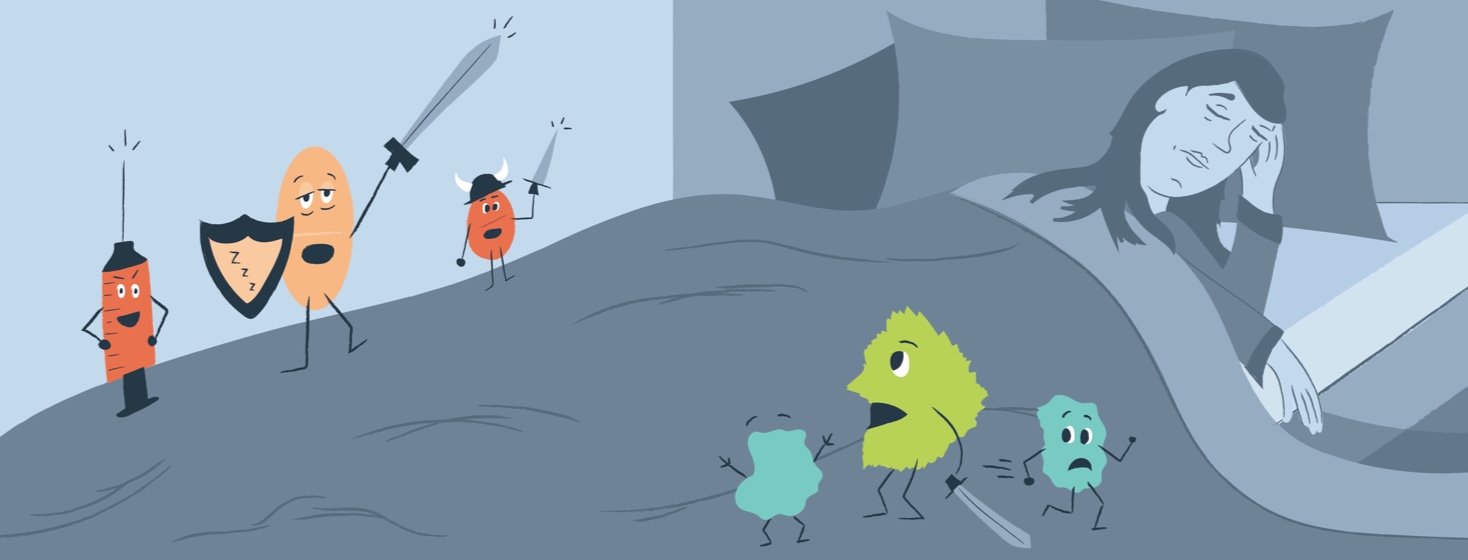Melatonin Can Be a Friend to Bladder Cancer Patients
If you’ve been diagnosed with bladder cancer, you've likely discussed your sleep habits with your doctor. Healing requires adequate sleep, after all; sleep gives your body windows of opportunity to fight infection, heal damage, and achieve a healthy balance among all your body’s intricate systems.
People with cancer who sleep well may feel stronger and more refreshed during the day. This is a plus when going through cancer treatment.
The silent hero in all this might not actually be sleep itself, but melatonin. It not only helps you get adequate sleep, but it also fights alongside your immune system to defend against cancer.
Melatonin: Your secret pal
You’ve likely heard of circadian rhythms. These biological rhythms shape the time in our lives. We’re awake in daylight for two-thirds of the “earth” day (24 hours) and asleep for that last third, after the sun goes down.
When circadian rhythms are disrupted, gene behaviors may be altered. Also, cells capable of growing tumors may become uncontrollable. Both of these outcomes of disrupted circadian rhythms promote the development and spread of cancer.
Melatonin is our body’s chief regulator of these rhythms. It’s also—surprise!—a cellular leader in anti-cancer activity in the body.
Melatonin can stop or slow tumor growth
Clinical lab experiments have shown that melatonin can stop or slow tumor growth when applied directly to cancer cells in a laboratory environment 1.
As “a natural agent with anti-cancer functions”, it’s used to support:2
- Chemo
- Radiation
- Immune-system boosters
- Tumor vaccination
How does melatonin help the immune system fight cancer? It:2
- regulates the immune responses within cancer cells
- lessens the impact of pro-cancer immune system activities
- influences the response of the mitochondria—the “power plant” of most cells—to immune system activity caused from tumors
Melatonin helps you fight cancer
However, this doesn’t mean melatonin “cures” cancer. Instead, melatonin improves your ability to fight cancer and provides relief from chemotherapy’s side effects. It can also minimize drops in blood cell counts if you’re undergoing radiation.1
Who knew melatonin to be more than just a pill taken to fall asleep? You may be surprised to learn there are two kinds.
Natural melatonin
Our brains naturally produce melatonin in the pineal gland. It's a tiny pea-shaped organ in the direct center of the brain.
The pineal gland releases melatonin as environmental light dims in the afternoon. In this way, melatonin famously assists in the shift from wake to sleep.
Sleep, prompted by adequate levels of natural melatonin, provides a protective anti-cancer support system. The more and better uninterrupted sleep you get at night, the better your brain and body can shield against the malignant invasion of cancer cells.
A boost to the immune system
Why? Your brain’s secretion of natural melatonin not only supports the sleep-wake process but also boosts the immune system.3
The presence of healthy levels of melatonin alone can potentially thwart cancerous cells from damaging or destroying healthy cells while assisting immune system cells in fighting the disease.3
If a person with cancer struggles to produce adequate melatonin naturally, man-made supplements exist. Manufactured melatonin can be purchased over the counter. The tablets are fairly inexpensive. Taking a melatonin supplement can address circadian rhythm disruptions.
Supplemental melatonin is generally recognized as safe (GRAS) by the FDA. Still, more research needs to identify appropriate dosing and its use in children.
What we do know: it still has side effects, which include:1
- Headaches
- Drowsiness
- Changes in sleep patterns
- Insomnia
- Vivid dreams or nightmares
- Changes in mental status
- Feelings of disorientation
- Increased heart rate
- Flushing
- Itching
- Abdominal cramps
- Abnormally low body temperature
How melatonin helps the body fight cancer
The immune system is highly influenced by the presence of melatonin.
Two chief anti-cancer immune cells (natural killer cells, or NK, and cytotoxic T lymphocytes, or CTLs) benefit from melatonin’s support.2 Both identify and eliminate abnormal cells taken over by cancer.
Other contributors to tumor development: T regulatory cells (Tregs) and cancer-assisted fibroblasts (CAFs).2 Tregs provide oversight to the entire immune system.4 Meanwhile, CAFs serve as the “architects” behind tumor creation.5
Oncologists use melatonin as a cancer-fighting “wingman” to support anti-cancer immune cells while boosting Tregs and blocking CAFs.
Getting better sleep
Getting more and better sleep is a key part of any cancer-fighting strategy. Not only does sleep reinvigorate you, prevent insomnia, and offset cancer-related fatigue, it resets and balances your circadian rhythms.
Taking melatonin supplements is common during cancer treatment, not only for sleep, but for more hidden "heroics." However, it’s best to work with your doctor on dosage and the timing of melatonin supplements. When you take it is critical, and taking too much may create more problems than it solves.6
Still, ultimately, melatonin can be a cancer patient’s friend. If you've not yet become acquainted, don't be afraid to ask your doctor about bringing melatonin into your approach for fighting bladder cancer.

Join the conversation